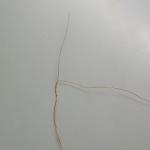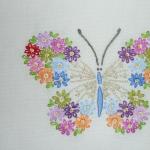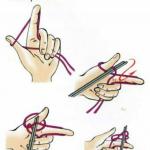Тема рыбалка на английском языке. Список вопросов для развития устной речи учащихся Что необходимо сделать
Родители часто задумываются, как научить их маленькое чадо английскому языку. Наш совет — не паниковать. Существует много разных методик, которые помогут малышам освоить обучение или тренировку английских слов.
Примечание: О методиках в игровой форме можно прочитать в разделе « «
Если ваш малыш уже освоил слова на английском языке определённой тематики, то можно использовать игру «Рыбалка» (Fishing game) для тренировки слов.
Примечание: Ознакомиться с лексикой на английском языке различной тематики можно в разделе « «
Например, с малышами, уже выучившими названия некоторых животных, тренировать слова можно в игре «Рыбалка» (Fishing game). В этой универсальной игре вообще можно тренировать множество разных слов.
Что необходимо сделать?
Нарезаем карточки «Животные» (можно распечатать, можно нарисовать самим). Берём лист синего картона, либо рисуем озеро на белом листе. К каждой карточке прикрепляем бельевую прищепку (для ловли на магнит). Переворачиваем так, чтобы не было видно картинки. Делаем удочку с помощью палочки и магнитика на нитке, и начинаем «ловить рыбок»:
— I’m fishing! (Я рыбачу!)
— I’m catching! (Я ловлю!)
— What are you catching? (Что ты ловишь?)
— I’m catching a… (перечисление животных на английском языке) (я ловлю..)
Игра «Рыбалка» (Fishing game) для изучения английских слов
Если у родителей нет времени на самостоятельное изготовление деталей для игры, то в любом детском магазине можно приобрести уже готовую игру «Рыбалка», останется только прикрепить карточки необходимой тематики:
Игра «Рыбалка» (Fishing game) для изучения английских слов Игра «Рыбалка» (Fishing game) для изучения английских слов Игра «Рыбалка» (Fishing game) для изучения английских слов
1. What is your first name?
2. What is your surname?
3. How old are you?
4. Where do you live?
5. Where were you born?
6. What is your date of birth?
7. What is your address?
8. What is your telephone number?
9. Is your family large?
10. Are you an only child?
11. What are your parents?
12. Who do you most take after, your mother or your father?
13. Can you describe yourself?
14. Can you describe your parents?
15. What are your household duties?
16. Do you always plan your day beforehand?
17. What do you usually do in the evenings?
18. How do you spend your weekends?
19. Are you a stay-at-home or do you prefer to go out when you have some time to spare?
20. Are you fond of having friends in?
21. Do you often have parties?
22. What do you think makes one"s home cozy?
23. Have you got a room of your own?
24. Can you describe it?
25. What is your hobby?
26. Who is your best friend?
27. Can you describe him/her?
28. How long have you been friends?
29. Do you have much in common or are you different?
30. How do you spend your free time together?
31. Is your friend easy to get along with?
32. What qualities do you most admire in people?
33. What characteristics annoy you most in people?
34. What does the word «lazy» mean?
35. How would you describe a person who helps other people?
36. What do we call a person who expects good things to happen?
37. What do we call a person who expects bad things to happen?
38. Do you believe in horoscopes?
39. What are the good and bad characteristics associated with your sign of the zodiac?
40. What is your attitude to astrology?
41. When did you leave school?
42. What kind of school was it?
43. What subjects were you good at?
44. What subjects did you like?
45. What subjects did you dislike?
46. What subjects were you bad at?
47. Who was your favourite teacher? Why?
48. Did you spend a lot of time at school?
49. What out-of-class activities did you take part in?
50. Were there any hobby clubs or societies in your school?
51. Did you take part in any of them?
52. What time did you usually come home from school?
53. Did you have to wear a uniform?
54. Could you choose the subjects you studied?
55. Did you like your English classes?
56. What did you do during your English lessons?
57. When did you begin studying English?
58. Had you studied English before you came to school?
59. How long have you been learning English?
60. Were all your English teachers good?
61. What marks did you usually get in English?
62. Do you find English grammar easy or difficult to study?
63. What about English pronunciation?
64. How many vowels are there in the English alphabet?
65. How many letters are there in the English alphabet?
66 What English-speaking countries do you know?
67. Have you been to any of them?
68. When variant of the English language do you like more: British or American?
69. Did you study any other languages at school?
70. How long does it take a person to learn to speak a foreign language, in your opinion?
71. Do your find languages easy or difficult to learn?
72. What other languages besides English would you like to learn?
73. What languages belong to the family of Romance languages?
74. What languages belong to the family of Slavic languages?
75. What family does the English language belong to?
76. What language is spoken in France? Germany? China?
77 What language is spoken in Holland? Switzerland? Brazil?
78. Why is it important to know foreign languages?
79. What are your future plans?
80. Why did your decide to study at our University?
81. What professions do your know?
82. Which of them require the knowledge of foreign languages? 83. What is an interpreter?
84. What"s the difference between an interpreter and a translator?
85. What"s the difference between " to take an exam" and " to pass an exam" ?
86. Which are the most prestigious professions today?
87. Science and technology constantly create new jobs. Can you name any of them?
88. Will people work less in the future? Why do you think so?
89. Experts say that we"ll have to change jobs more often in the future? Do you know why?
90. Are you optimistic about the future?
91. Are you fond of reading?
92. What famous English writers do you know?
93. What famous American writers do you know?
94. Who are your favourite English (American) authors?
95. Who are your favourite Russian writers?
96. Do you like poetry?
97. Which do you prefer to read, poetry or prose?
98. Have you ever written any poetry?
99. What is the basic difference between poetry and prose?
100. Who are your favourite Russian poets?
101. Do you read much?
102. How much do you read in English?
103. Is it difficult for you to read English books in the original?
104. What kinds of books do you know?
105. If you could choose between reading a book or seeing the same story on TV, which would you prefer? Why?
106. Do you believe that one day computers will replace books?
107. What are the advantages of the Internet?
108. Do you choose different sorts of books for different occasions (holidays, journeys, bed)?
109. What"s the difference between a biography and autobiography?
110. What"s the difference between fiction and non-fiction books?
111. Who are your favourite modern authors?
112. What kind of books do they write?
113. Which book did you particularly enjoy reading recently?
114. What did you like about the book?
115. What was it about?
116. Are there any books you"d like to reread?
117. Do you sometimes borrow books from a library?
118. What do you call a person who works in a library?
119. Have you got a lot of books at home?
120. Do you think it is good to have a home library?
121. Have you got any books in English at home?
122. Why do so many people like to read crime stories?
123. Can you explain the difference between a bookshop and a library?
124. Do you read newspapers?
125. What newspapers do you read?
126. What are your favourite magazines?
127. Where can you buy newspapers and magazines?
128. What newspapers and magazines do you subscribe to?
129. Which sections of a newspaper are you especially interested in?
130. Do you read reviews of new books, films and plays?
131. What is an editorial?
132. What"s the difference between an editor and a reporter?
133. Do you like to read stories about the private lives of pop stars and actors?
134. Do you read any newspapers in English?
135. What British newspapers do you know?
136. Do you agree that radio and television have made newspapers unnecessary?
137. Do you like watching TV?
138. How much time do you spend watching TV?
139. Do the mass media report the events objectively?
140. What TV programmes are most popular with young people?
141. What are your favourite TV programmes?
142. What programmes do your parents usually watch?
143. What do you think of soap operas?
144. Do you like quiz shows?
145. Do you ever watch educational TV programmes? Are they helpful?
146. Are you an Internet-user?
147. How many times have you been to the cinema this year?
148. Who are your favourite actors?
149. Who are you favourite film directors?
150. What do you think of horror films?
151. Which film did you particularly like recently?
152. What was it about?
153. Who starred in the film?
154. Have you seen any films in English?
155. How often do you go to the theatre?
156. When did you last go to the theatre?
157. Did you like the performance?
158. Did the audience like the performance?
159. Was the house full?
160. Where were your seats?
161. Did you like the scenery?
162. What was the play about?
163. Who played the leading parts?
164. Was the cast good?
165. What do you call a place where the performance takes place?
166. Where do you buy tickets?
167. What do we call a person who writes plays?
168. What do we call a person who directs the staging of a play?
169. What is your favourite theatre and why?
170. Which do you enjoy more: going to the theatre or going to the cinema?
171. Do you like opera?
172. What are your favourite operas?
173. What are your favourite ballets?
174. Which do you prefer: ballet, opera or musical concerts?
175. Who are your favourite composers?
176. Do you enjoy listening to classical music?
177. Which do you prefer: pop music or classical music?
178. What"s the difference between a concert and a rehearsal?
179. What"s the difference between a composer and a musician?
180. Does loud music annoy you?
181. Who are your favourite pop singers and groups?
182. Does music help you to escape from the problems of everyday life?
183. How often do you go to discos?
184. Do you play any musical instruments?
185. Did you take music lessons? For how long?
186. Have you ever been to a concert you didn"t like?
187. Do you watch MTV?
188. How often do you visit art galleries or fine arts museums?
189. How many times have you been to the Tretyakov Gallery?
190. When did you last go to the Pushkin Museum of Fine Arts?
191. What museums have you been to this year?
192. Have you been to any exhibitions lately?
193. Who are your favourite Russian painters?
194. What famous English and American painters do you know?
195. Where did you see their pictures?
196. Do you like abstract art?
197. What"s the difference between a landscape and a seascape?
198. Can you draw?
199. Have you ever been to the Hermitage in St Petersburg?
200. What art galleries in London do you know?
201. Are you fond of reading science fiction?
202. Who is your favourite science fiction author?
203. Which of the writers foresaw the flight to the Moon?
204. Which great Russian scientist worked out the theory of space flights and designed the first rocket?
205. What achievements have been made in space exploration?
206. Who was the first cosmonaut?
207. Who was the first man to land on the Moon?
208. Do you think there is life on other planets of the solar system?
209. Do you believe in UFOs (Unidentified Flying Objects)?
210. Can you predict the future? What will our life be like in 50 years?
211. What outstanding scientists do you know?
212. What famous inventors do you know?
213. What kind of people are considered to be outstanding? What qualities must they possess?
214. Is it enough to be talented to be called outstanding?
215. Do you agree that computers have completely changed our lives?
216. What possibilities does genetic engineering open?
217. Are you for or against cloning people? Why?
218. Do you think people will live longer in the future? Why?
219. What has man"s interference in nature led to?
220. Why do so many species of animals and plants die out for ever?
221. What pollutes and poisons the air?
222. Why are acid rains so dangerous for people?
223. What do you know about the consequences of the Chernobyl tragedy?
224. What should every country do to protect nature and to clean the environment?
225. Is international cooperation necessary to create a system of ecological security? Why do you think so?
226. What countries is the UK made up of?
227. What is the capital of the UK?
228. What is the capital of Wales?
229. What is the capital of Scotland?
230. What is the capital of Northern Ireland?
231. Who is the Prime Minister of Great Britain?
232. What places of interest in London do you know?
233. What do you know about Westminster Abbey?
234. What do you know about the Houses of Parliament?
235. Where is the residence of the Queen?
236. Who was St Paul"s Cathedral built by?
237. What do the stars on the American flag stand for?
238. How many stars are there on the US flag?
239. What is the capital of the USA?
240. Who was the first president of the USA?
241. Who is the US President now?
242. What great Americans do you know?
243. Who discovered America?
244. What large cities in the USA do you know?
245. Which city is more American: Washington or New York?
246. What places of interest in Washington do you know?
247. When did the Russian Federation become an independent state?
248. What parts of Russia have you been to?
249. What is Russia rich in?
250. When was Moscow founded and who by?
251. Can you describe the centre of Moscow?
252. What historical monuments in Moscow do you know?
253. What world-famous museums in Moscow do you know?
254. What do you know about Red Square?
255. What is your favourite place in Moscow?
256. What are the most interesting tourist sights in your city?
257. What kinds of public transport do you know? Which do you prefer?
258. Are you fond of travelling?
259. If you were free to travel wherever you wanted, what countries would you visit?
260. Why do you think so many people like travelling?
261. Which is the most convenient way of travelling?
262. Which is the quickest way of travelling?
263. What are the advantages and disadvantages of travelling by car?
264. What are the advantages and disadvantages of travelling by air?
265. Have you ever been abroad?
266. What"s the difference between a voyage and a journey?
267. What great travellers of the past do you know?
268. Would you like to travel in space?
269. Do you find time for sports?
270. What kinds of sports do you know?
271. What is you favourite kind of sports?
272. What sports do you enjoy watching?
273. What do you do to keep fit?
274. Have you got any bad habits?
275. Does anyone in your family smoke?
276. What do you know about the history of the Olympic Games?
277. What kinds of sports are popular in Britain?
278. What"s the difference between an amateur and a professional?
279. What do you do when you fall ill?
280. What does the doctor do when he comes to examine you?
281. What is the dentist"s job?
282. What must we do to be in good health?
283. What are the most important national holidays in Russia?
284. What do we celebrate on the 9th of May?
285. When do we celebrate Independence Day?
286. What religious holidays do you know?
287. What is you favourite holiday?
288. What are the most important public holidays in Great Britain?
289. What are the most important public holidays in the United States?
290. Are Christmas and Easter celebrated at the same time in all Christian countries?
291. How is New Year celebrated in your family?
292. Have you got a watch? What time is it now?
293. What are you doing now?
294. What will you be doing this time tomorrow?
295. What were you doing at six o"clock in the evening yesterday?
296. If you were a millionaire, how would you spend your money?
297. If you were free today, where would you spend the day?
298. If friends come to visit you tonight, how will you entertain them?
299. What are you going to do tonight?
300. If you are admitted to this faculty, what specialization would you like to take up?
Не знаю почему, но меня потянуло на рыбу…
Если вы увлекаетесь рыбалкой или же просто ресторанным бизнесом, тогда вам просто необходимо посмотреть на подборку: названия рыб (разных видов) на английском языке с переводом и транскрипцией. Сразу хочу предупредить, что не везде предоставляется транскрипция, так как таковую, просто напросто, не нашел. Вы скажете, на кой фиг мне нужно знать название 70 рыб? В принципе, знать вам их не обязательно, за исключением первых двух категорий людей, которых я упомянул в самом начале.
На сайте уже есть подборки, которые так или иначе связаны с едой: , Напитки на английском языке с переводом — . Но вот в ресторанах зачастую можно встретить разные блюда из рыбы, названия которых, лично для меня, были загадкой. Однажды, прогуливаясь с иностранцем по супермаркету, он меня спросил: «Что это за рыба?». Я немного «отупел», ибо реально не имел никакого понятия, как будет «карась» на английском языке, а вы знали?
В подборке есть много рыб, названия которых я первый раз слышу. Почему я их не удалил? Может, это только я не разбираюсь в рыбах, а другим они известны? В любом случае, легче удалить, чем создавать. Словарик «названия рыб на английском языке с переводом» действительно редкий и не совсем актуальный для большинства «жителей» сего сайта, но я люблю такие подборки, не знаю почему…
Если вы не заметили, то я попытался использовать стилистический прием вначале и в конце мини описания (правда как он называется, забыл).
Список рыб на английском языке с переводом:
Acara
— Акара
Shark; (некрупная) dogfish
— Акула
Anabas
— Анабас
Anchovy
— Анчоус
Mahseer
— Барбус
Barracuda
— Барракуда
— Бычок
Caspian roach
— Вобла
Chub
— Голавль
Loach
— Голец
Minnow
— Гольян
Pink Salmon
— Горбуша
Grouper
— Групер
Bergall, tautog
— Губан
Guppy
— Гуппи
Gourami
— Гурами
Danio
— Данио
Dace
— Елец
Ruffe
— Ёрш
Asp
— Жерех
Lancet fish
— Зубатка
— Камбала
Crucian (carp)
— Карась
Carp
— Карп
Chum Salmon
— Кета
Grey mullet
— Кефаль
Coho, silver salmon
— Кижуч
Stickleback, tittlebat
— Колюшка
Smelt
— Корюшка
Killer whale; shamoo
— Косатка
Rudd, red-eye
— Красноперка
Bream
— Лещ
Tench
— Линь
Salmon
— Лосось
Lamprey; (морская) stone eel
— Минога
Capelin
— Мойва
Moray
— Мурена
Navaga
— Навага
Burbot, eelpout, methy
— Налим
Neon
— Неон
Perch; bass
— Окунь
Grouper
— Окунь морской
Arctic cisco
— Омуль
Sturgeon
— Осётр
Halibut, turbot
— Палтус
Peled
— Пелядь
Gudgeon
— Пескарь
Haddock
— Пикша
Piranha
— Пиранья
Roach
— Плотва
Blue whiting
— Путассу
Chinese sleeper
— Ротан
Whitefish
— Ряпушка
(European) carp
— Сазан
Saury
— Сайра
Starred / stellate sturgeon
— Севрюга
Atlantic Herring
— Сельдь атлантическая
Salmon
— Сёмга
— Сиг
Zope
— Синец
Ray, scate
— Скат
Mackerel
— Скумбрия
Sheatfish
— Сом
— Ставрида
Sterlet
— Стерлядь
Zander, pikeperch
— Судак
Vimba
— Сырть
Greenling
— Терпуг
Tilapia
— Тилапия
Silver carp
— Толстолобик
Cod
— Треска
Tunny; tuna
— Тунец
Eel
— Угорь
Bleak
— Уклейка
Trout
— Форель
Grayling
— Хариус
Hake
— Хек
Chinook Salmon
— Чавыча
Ziege
— Чехонь
Pike; (морская) ling
— Щука
Ide
— Язь
Слова по теме «Fish» на английском с транскрипцией
| Acara | Acara | Акара |
|---|---|---|
| Shark; (некрупная) dogfish | ʃɑːk ; ˈdɒgfɪʃ | Акула |
| Anabas | Anabas | Анабас |
| Anchovy | ˈænʧəvi | Анчоус |
| Mahseer | Mahseer | Барбус |
| Barracuda | ˌbærəˈkuːdə | Барракуда |
| Bullhead, miller’s thumb, goby | ˈbʊlhɛd, ˈmɪləz θʌm, ˈgəʊbaɪ | Бычок |
| Caspian roach | ˈkæspɪən rəʊʧ | Вобла |
| Chub | ʧʌb | Голавль |
| Loach | ləʊʧ | Голец |
| Minnow | ˈmɪnəʊ | Гольян |
| Pink Salmon | pɪŋk ˈsæmən | Горбуша |
| Grouper | ˈgruːpə | Групер |
| Bergall, tautog | Bergall , tautog | Губан |
| Guppy | Guppy | Гуппи |
| Gourami | Gourami | Гурами |
| Danio | Danio | Данио |
| Dace | deɪs | Елец |
| Ruffe - | Ruffe - | Ёрш |
| Asp | æsp | Жерех |
| Lancet fish | ˈlɑːnsɪt fɪʃ | Зубатка |
| Plaice, flounder, sole, flatfish | pleɪs , ˈflaʊndə , səʊl , ˈflætfɪʃ | Камбала |
| Crucian (carp) | ˈkruːʃən (kɑːp) | Карась |
| Carp | kɑːp | Карп |
| Chum Salmon | ʧʌm ˈsæmən | Кета |
| Grey mullet | greɪ ˈmʌlɪt | Кефаль |
| Coho, silver salmon | Coho , ˈsɪlvə ˈsæmən | Кижуч |
| Stickleback, tittlebat | ˈstɪklbæk , ˈtɪtlbæt | Колюшка |
| Smelt | smɛlt | Корюшка |
| Killer whale; shamoo | ˈkɪlə weɪl ; shamoo | Косатка |
| Rudd, red-eye | Rudd , rɛd aɪ | Красноперка |
| Bream | briːm | Лещ |
| Tench | tɛnʃ | Линь |
| Salmon | ˈsæmən | Лосось |
| Lamprey; (морская) stone eel | ˈlæmpri ; (морская) stəʊn iːl | Минога |
| Capelin | Capelin | Мойва |
| Moray | Moray | Мурена |
| Navaga | Navaga | Навага |
| Burbot, eelpout, methy | ˈbɜːbət , ˈiːlpaʊt , methy | Налим |
| Neon | ˈniːən | Неон |
| Perch; bass | pɜːʧ; beɪs | Окунь |
| Grouper | ˈgruːpə | Окунь морской |
| Arctic cisco | ˈɑːktɪk ˈsɪskəʊ | Омуль |
| Sturgeon | ˈstɜːʤən | Осётр |
| Halibut, turbot | ˈhælɪbət , ˈtɜːbət | Палтус |
| Peled | Peled | Пелядь |
| Gudgeon | ˈgʌʤən | Пескарь |
| Haddock | ˈhædək | Пикша |
| Piranha | pɪˈrɑːnə | Пиранья |
| Roach | rəʊʧ | Плотва |
| Blue whiting | bluː ˈwaɪtɪŋ | Путассу |
| Chinese sleeper | ˌʧaɪˈniːz ˈsliːpə | Ротан |
| Whitefish | ˈwaɪtfɪʃ | Ряпушка |
| (European) carp | (ˌjʊərəˈpi(ː)ən) kɑːp | Сазан |
| Saury | ˈsɔːri | Сайра |
| Starred / stellate sturgeon | stɑːd / ˈstɛlɪt ˈstɜːʤən | Севрюга |
| Atlantic Herring | ətˈlæntɪk ˈhɛrɪŋ | Сельдь атлантическая |
| Salmon | ˈsæmən | Сёмга |
| Baltic whitefish, cisco, pollan | ˈbɔːltɪk ˈwaɪtfɪʃ , ˈsɪskəʊ , pollan | Сиг |
| Zope | Zope | Синец |
| Ray, scate | reɪ , scate | Скат |
| Mackerel | ˈmækrəl | Скумбрия |
| Sheatfish | ˈʃiːtfɪʃ | Сом |
| Jack mackerel, horse mackerel | ʤæk ˈmækrəl , hɔːs ˈmækrəl | Ставрида |
| Sterlet | ˈstɜːlɪt | Стерлядь |
| Zander, pikeperch | ˈzændə , pikeperch | Судак |
| Vimba | Vimba | Сырть |
| Greenling | Greenling | Терпуг |
| Tilapia - | Tilapia - | Тилапия |
| Silver carp | ˈsɪlvə kɑːp | Толстолобик |
| Cod | kɒd | Треска |
| Tunny; tuna | ˈtʌni ; ˈtuːnə | Тунец |
| Eel | iːl | Угорь |
| Bleak | bliːk | Уклейка |
| Trout | traʊt | Форель |
| Grayling | ˈgreɪlɪŋ | Хариус |
| Hake | heɪk | Хек |
| Chinook Salmon | Chinook ˈsæmən | Чавыча |
| Ziege | Ziege | Чехонь |
| Pike; (морская) ling | paɪk ; (морская) lɪŋ | Щука |
| Ide | Ide | Язь |
Подборка в формате для Lingvo Tutor 12
Подборка в формате WORD с транскрипцией
UPD: Самые популярные названия рыб на английском языке
Список самых употребляемых рыб:
Barracuda
Anchovy
Shark
Carp
Salmon (два раза указана: как «лосось» и «сёмга»)
Piranha
Ray (scate не слышал)
Cod
Tuna
Eel
Trout
Caspian roach
– Вобла
Pink Salmon
– Горбуша
Ruffe
– Ёрш
Lancet fish
– Зубатка
Plaice, flounder, sole, flatfish
— камбала
Crucian (carp)
– Карась
Smelt
– Корюшка
Bream
– Лещ
Capelin
– Мойва
Burbot, eelpout, methy
– Налим
Perch; bass
– Окунь
Grouper
– Окунь морской
Sturgeon
– Осётр
Saury
– Сайра
Atlantic Herrin
g – Сельдь атлантическая
Sheatfish
– Сом (я его называл catfish, хотя это вроде тоже правильно)
Zander, pikeperch
– Судак
Pike;
(морская) ling – Щука
Ide
– Язь
«Я слышала о разговорных клубах давно, но мне казалось это достаточно странным занятием. Я не понимала, о чем можно болтать с незнакомыми людьми, да ещё и на ломаном английском. Тем не менее, первая сессия меня вовлекла с первых же минут. В подобных разговорах нужен образующий центр, яркий и задорный. Шон, носитель языка, именно таким и оказался. Он в считанные секунды вовлёк всех участников в единую игру. Спасибо большое Шону, за удовольствие от общения Спасибо Ирине, за очередной толчок из зоны комфорта в приятное барахтание в незнакомой среде Я занимаюсь индивидуально с австралийским учителем, но групповой опыт важен и нужен наравне с другими видами практики. Я с удовольствием продолжу. Спасибо организаторам»
Екатерина из Москвы, 33 годаМилана Богданова
Михаил Чуканов
Наташа КалининаОнлайн- курс : «Учимся читать на английском с удовольствием» : « Спасибо всем создателям курса за эту возможность!!! То, что произошло — это очень значимое событие для меня — я действительно начала читать (и продолжаю это с удовольствием) на английском языке! Это потрясающе, потому что я боялась близко подойти не то, что к книгам на английском языке, мне даже просмотр небольшой информации, англоязычных сайтов вызывал существенные затруднения.»
Милана Богданова
Эля Алиева«У меня всегда были убеждения, что чтение книг на чужом для меня языке это сверх невыполнимая для меня задача, но благодаря опытным преподавателям и моей чудесной группе поддержки (участники обучения с кем я была в группе), я открыла для себя уникальную возможность читать и еще получать огромное удовольствие от чтения. »
Михаил ЧукановОнлайн-курс «АНГЛИЙСКИЙ ЧЕРЕЗ САМОРАЗВИТИЕ»: « Я больше стал применять английский для практических задач. Например, недавно сам выбрал на лондонском сайте объявлений предложение о продаже гитары, сам вел переписку с продавцами и купил легендарную гитару у одной английской музыкальной семьи в Лондоне. Мы даже посидели-пообщались с ними «за жизнь». Для меня это маленькая победа! »
Ольга ПашкевичОнлайн-курс «Учимся читать на английском с удовольствием»: «Серьезно, вот скажи мне кто еще пару месяцев назад, что я буду каждый вечер посвящать чтению на английском, я бы очень сильно удивилась. Раньше для меня это была скорее пытка, чем удовольствие, скорее необходимость, чем выбор.»






